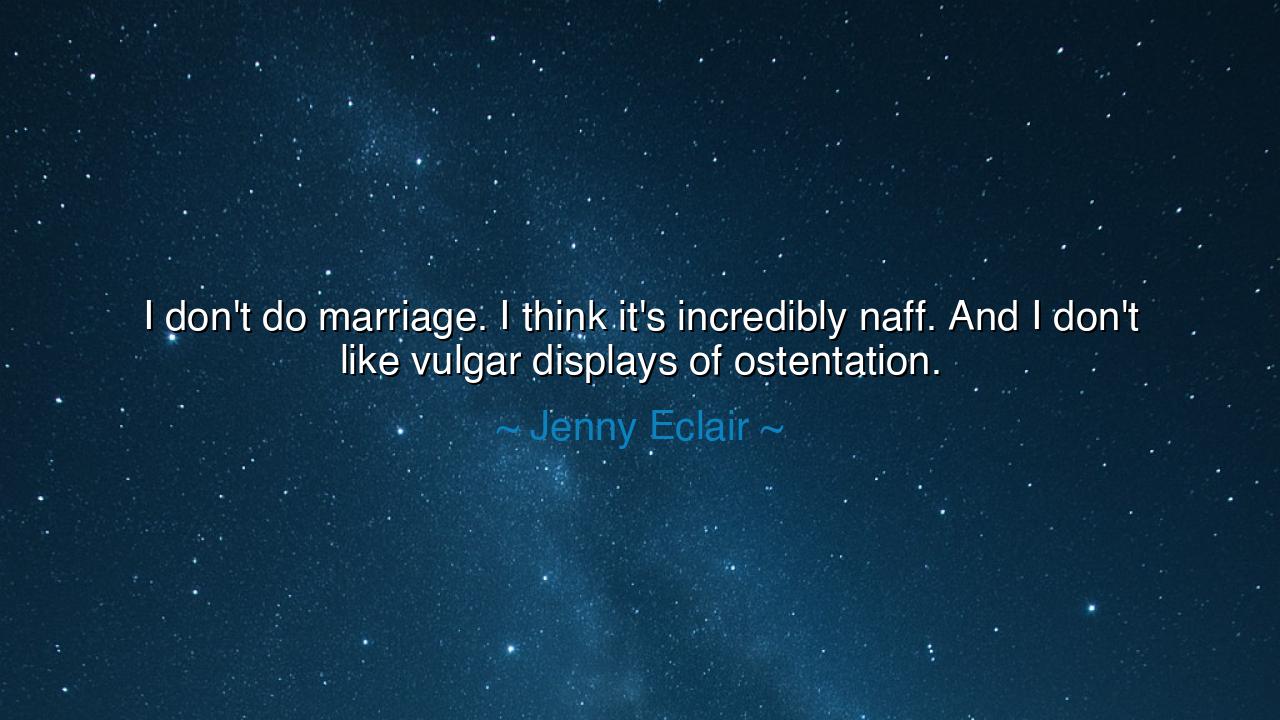
I don't do marriage. I think it's incredibly naff. And I don't
I don't do marriage. I think it's incredibly naff. And I don't like vulgar displays of ostentation.






When Jenny Eclair said, “I don’t do marriage. I think it’s incredibly naff. And I don’t like vulgar displays of ostentation,” she was not simply rejecting a social institution—she was voicing a rebellion against pretense, against the hollow show of affection that often replaces true intimacy. Beneath the humor and the bluntness of her tone lies an ancient truth: that love, when bound too tightly to display, can lose its soul. Her words challenge us to look past the glitter and the ceremony and to ask: What is genuine? What endures when the noise fades? In this, Eclair speaks like the philosophers of old—those who valued authenticity above approval and substance over spectacle.
To understand her meaning, one must see marriage, in her critique, not as an attack on love itself, but on the performance of love. The phrase “vulgar displays of ostentation” points to a culture that has turned commitment into pageantry. The grand wedding, the diamond rings, the carefully curated image—these, she implies, are not the essence of devotion but the trappings of ego. In saying “I don’t do marriage,” she does not scorn connection or loyalty; rather, she resists the institutional expectations that often suffocate the natural, simple beauty of human affection. Hers is the voice of one who seeks purity of feeling over formality of ritual.
The ancients, too, warned of this danger—the loss of meaning beneath the weight of ornament. In the teachings of Diogenes the Cynic, we find the same disdain for excess. He lived without comfort or luxury, believing that simplicity was the path to truth. When asked why he rejected society’s customs, he said, “I would rather have one honest friend than a thousand admirers.” Jenny Eclair’s words carry that same spirit. Her rejection of “vulgar ostentation” is not cynicism—it is a defense of authenticity. She reminds us that love needs no crown to be royal, no ceremony to be sacred. It lives, not in the spectacle, but in the quiet, steadfast bond between two honest souls.
To see this truth in history, one might recall the life of Mahatma Gandhi, who refused extravagance even in matters of the heart. When he married Kasturba, their union began in the simplicity of duty and companionship rather than display. In their later years, they transcended even the physical, finding in each other a partnership of spirit and sacrifice. Their marriage, stripped of ornament and excess, became a union of ideals—proof that love’s greatness is measured not by grandeur but by grace. In their humility, we see the power of Eclair’s insight: that what is real does not need to be flaunted.
Her use of the word “naff”—a term of British slang meaning tasteless or lacking sophistication—speaks not only of humor but of discernment. She rejects what is shallow and performative, calling instead for depth and truth. In a world obsessed with appearances, where even love is marketed and broadcast, she stands as a voice of defiance. To her, love is not a possession to be exhibited, but an experience to be lived. Her philosophy is one of quiet integrity: to value meaning over form, reality over illusion.
And yet, her tone also reveals the vulnerability of one who has seen through the veil and chosen solitude over falseness. To say “I don’t do marriage” can also mean “I do not wish to pretend.” It is the voice of the soul weary of false promises, yearning for connection that does not require performance. There is courage in such a confession—the courage to live truthfully, even when truth makes one stand apart. In this way, Eclair becomes a kind of modern stoic, one who finds dignity not in society’s approval but in the authenticity of her own convictions.
The lesson her words offer is profound: do not let the world’s glitter blind you to the quiet light of truth. Love is not made sacred by spectacle, nor made real by ritual. Seek simplicity. Let your affection speak in deeds, not in displays. A single honest gesture is worth more than a thousand staged confessions. Remember that in all things—love, friendship, or art—the purest form is the one least adorned. The heart that gives without show gives most fully.
So, my child, when you love, love truly. When you commit, commit without need of applause. Reject the vulgarity of false splendor and the emptiness of vanity. Let your love be private, humble, and enduring—a candle in the quiet rather than fireworks in the sky. For as Jenny Eclair reminds us, the soul grows weary of spectacle, but it is forever nourished by truth. And when the music stops and the crowd disperses, only what is genuine will remain—and that, my dear one, is the love worth keeping.






AAdministratorAdministrator
Welcome, honored guests. Please leave a comment, we will respond soon